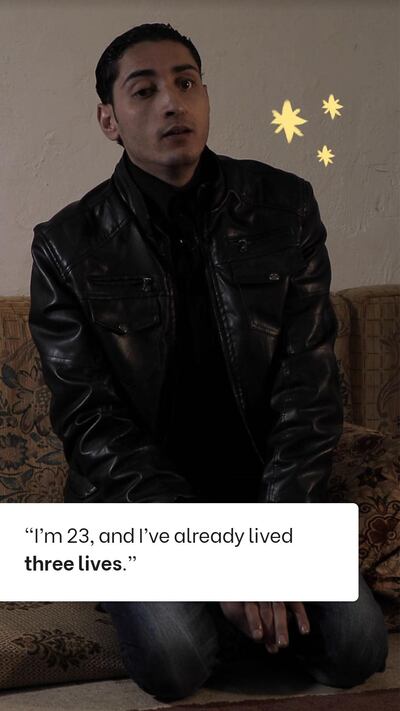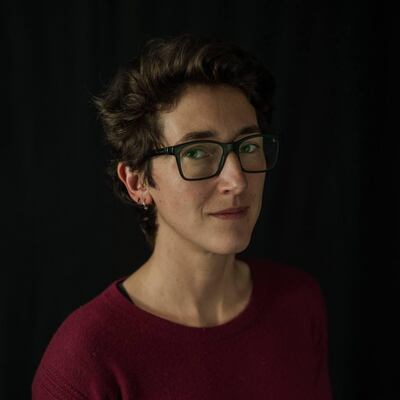A forward-thinking initiative is helping to shine a light on the poignant stories of four men whose lives have been scarred by years of conflict in the region.
Bodies at War, developed as a smartphone experience, takes viewers on a harrowing yet ultimately inspirational journey with four men touched by tragedy in Iraq, Syria and Yemen.
The project was developed by Doctors Without Borders/Médecins Sans Frontières (MSF) in an effort to humanise the struggles of people caught out up in war zones across the globe.
The thought-provoking work was due to be unveiled at the Dubai International Humanitarian Aid and Development (DIHAD) conference on Tuesday, however the event was postponed due to the outbreak of coronavirus.
Each of the people featured suffered both physical and mental wounds which they are battling to recover from.
‘We wanted to tell the stories of our four patients to talk about the different crises ongoing in Yemen, Syria and Iraq,” said Julie Santolini, head of MSF's multimedia unit.
“Using this unique smartphone platform, we hope to see younger audiences – those who typically engage with mobile content – connect with the stories of the daily lives of people living in war zones in the Middle East.”
The people featured in the project included Syrian Joud Tabash, 25, and Iraqi Hassan Kamel al Obaidy, 42.
Bodies at War offered a glimpse at their lives before they suffered life-changing injuries as well as the aftermath of their experiences on both themselves and their families.
Joud Tabash was only 15 when an uprising occurred in his home country of Syria, which descended into civil war.
He was seized by an armed group and suffered two days of torture before being finally released.
Mr Tabash was taken for reconstructive surgery to the MSF facility in Amman, Jordan, before returning to Syria in 2014, where he was seriously injured once again when he was hit by a stray bullet.

He was sent back to Jordan for treatment but because he had previously returned to Syria he had given up his refugee status and spent the next three years in limbo, not knowing if he was going to be sent back home again.
A social worker at the MSF hospital took on his case and helped him to finally obtain refugee status, which he was granted in April 2018.
More than 5.6 million people have fled Syria since 2011 according to the United Nations High Commissioner for Refugees (UNHCR).
Hassan Kamel al Obaidy was 14 when his father was shot dead in front of their family home in Baghdad in 1992.
“I was so young that I was unaware that I should be working to support my nine siblings and pregnant mother,” he said, during a video interview shown during Bodies At War.
When he himself was wounded in 2008, his 16-year-old brother Adnan was forced to leave school, find a job and take care of the family while he received treatment in Amman, fearing his leg would have to be amputated.
“Iraq has always been plagued by war and conflict. All my ancestors endured what we’re going through now,” he said.
He spent three years in Amman, initially traumatised by the prospect of never walking again.
When he finished his treatment he decided to return to Iraq, despite warnings from friends and family about the situation back home.
“I thought nobody could ever care about me as much as my family, so I chose to return to Iraq and live with my family,” he said.
“I'm happy I came back.”
More than 3 million Iraqis have been displaced since 2014 with roughly 260,000 becoming refugees in other countries.

Agnes Varraine-Leca, multi-media production manager on the project, said the main goal was to make as many people as possible aware of the suffering that many endured in the Middle East.
“It was about finding the right people who were confident enough to talk about their experiences,” she said.
“It’s difficult for a man to open up and talk about leaving his family behind, while he went to another country to receive treatment for his injuries, and what that meant to him.”
All four men featured received treatment at the MSF hospital in Amman, which has been operating for almost 15 years.
“There was a sense of strength in their words and a lot of sadness,” said Ms Varraine-Leca.
"Somehow they were able to rebuild their lives after what had happened to them.
“We are trying to take their stories and humanise their experiences for others.”
A documentary on the project is also due to be aired in the UAE later in the year.


